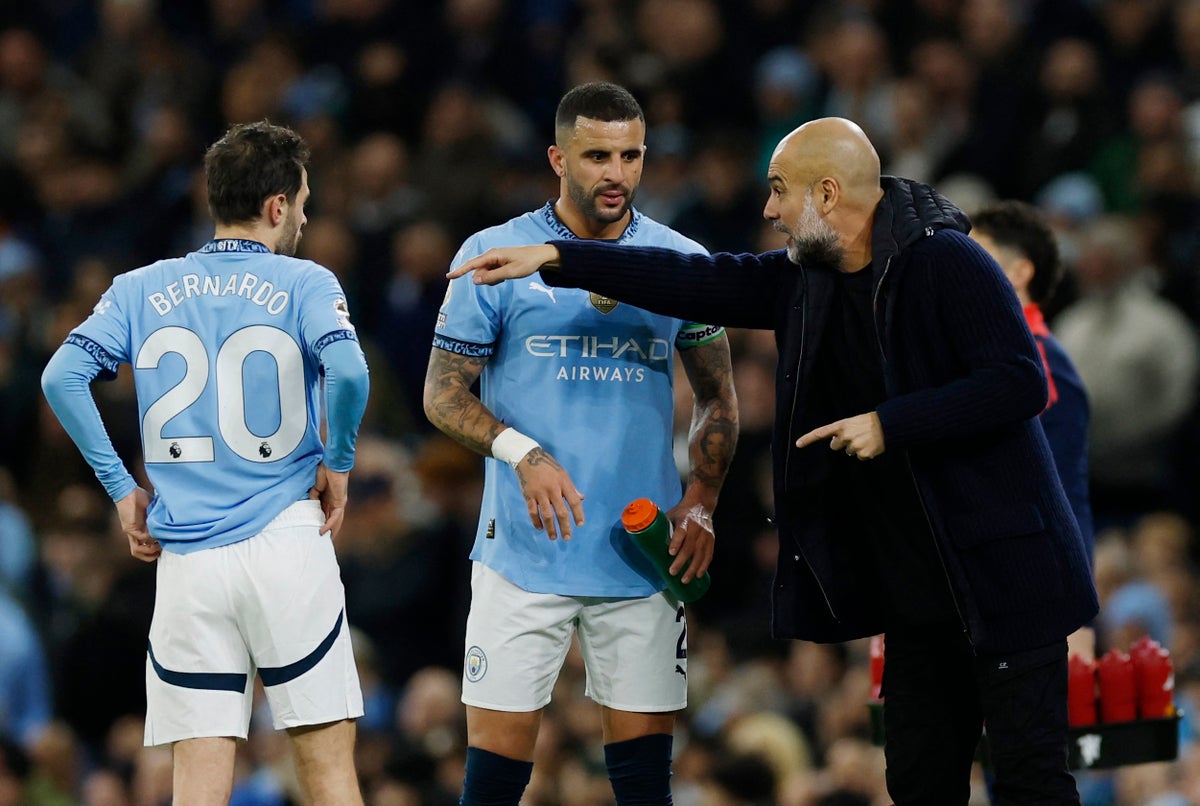This was neither the most extreme nor the most costly muddled thinking from anyone of Manchester City’s persuasion. Yet as Pep Guardiola assessed a series of results that would have seemed beyond anyone’s comprehension two months ago, he kept citing one statistic. “When you lose eight out of ten at a big club,” he said. Actually, it’s eight out of eleven, but that’s little consolation.
Where does it come from? Where does it end? Not against Manchester United. Just when City thought they were out of trouble, they pulled themselves together. The manager’s godfather blamed himself. “I’m the boss, I’m the manager, I’m not good enough,” Guardiola said, self-flagellated. “It’s the truth.”
His understanding of certain facts betrayed him. Not the others. “Maybe in a year or a year and a half we could have lost eight games,” he said. City lost just five matches in the whole of last season, six in 2018-19, seven each in 2017-18 and 2022-23, eight in 2020-21 and again in 2021-22. It’s now eight since October 30, with a draw against Feyenoord looking like a defeat. Relatively recently, City were unbeaten in 32 Premier League matches and 26 Champions League matches. “We were top of the league and the only undefeated team in Europe,” Guardiola said. Now, only Southampton have so few points since the beginning of November.
Amad Diallo won a derby for Manchester United. City lost him to themselves. “At this level, a game or two is bad luck. We can’t say it’s lucky or unlucky – 10 games is not that,” Bernardo Silva said scathingly. “Minute 87 in a derby, 1-0 win and our corner ends in a penalty for them, if we make these stupid decisions with three or four minutes to go you deserve to pay for that. Today, at the last minute, we played like under-15s.


He went by theme: bad decisions, individual errors. Matheus Nunes was the main culprit against United. In other games it was Ederson, or Kyle Walker or Josko Gvardiol. City accumulates individual errors. There was a collective rupture. Nobody plays well; there are just degrees of play below their best. With Walker and Ilkay Gundogan, in particular, there’s a feeling they’ll never go back.
Yet Guardiola’s teams tend to be noted for their skill and chemistry. More City. “We are not fluid, we were a team that always played with composure and now we don’t have it anymore,” he added. One of the recurring themes among his setbacks over the years has been that teams so expert and accustomed to domination can have brief, sharp shocks, when the system malfunctions and end up conceding goals in rapid succession.
They took this to new levels. Two in three minutes against United, two in five against Brighton, two in eight against Tottenham, three in 11 against Sporting, three in 15 against Feyenoord: for a team of their experience, for serial winners, City have a weakness. Physically, they can be controlled. Psychologically, they may be overwhelmed.
“I’m not good enough to find a way for players to find peace in their body and mind to play,” Guardiola said. His distressed expressions and sleep problems show that he is not at peace with himself. The city is falling apart.
“We can’t stand this situation for very, very long with the coach or with the players, that’s obvious,” said a coach who signed a new contract last month. “You need to change something.” Now Guardiola is already wondering if he will stay. “I want it desperately,” he said; he has already shown himself to be more committed than initially expected. A manager in his golden years is categorical: he will not leave in times of conflict.


But staying means overseeing an overhaul. “I knew it would be a difficult season from the start, but I didn’t expect it to be as difficult as it is right now,” Guardiola said. And if that raises the question of why he expected it to be difficult and why City didn’t do more in the transfer market, the problems have now multiplied. This means that the reconstruction will be more extensive. City underestimated the decline of Walker and Gundogan. They didn’t plan to lose Rodri.
Still, a team that often seems to have too many high-profile players probably needs at least five or six additions. They need a defensive midfielder and another striker to end the over-reliance on Rodri and Erling Haaland to be the sole specialist in either role. They need at least one more midfielder, younger and more athletic than Kevin De Bruyne, Mateo Kovacic and Gundogan. They need a right back to replace Walker. They might need another defender, whether it’s a true left-back or a centre-back who will be fit more often than Nathan Ake and John Stones.
In the meantime, they need to regain confidence and cohesion. They must be able to follow the games, react to setbacks, overcome difficult periods and capitalize on the good ones. And they need to stop playing like the under-15s.
